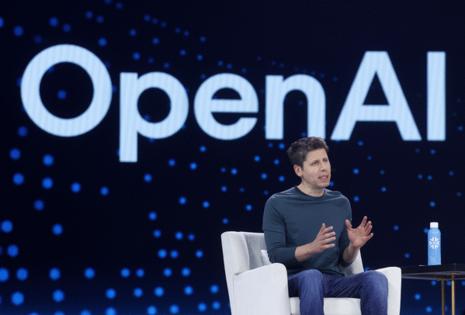Parmy Olson: ChatGPT-5 hasn't fully fixed its most concerning problem
Published in Op Eds
Sam Altman has a good problem. With 700 million people using ChatGPT on a weekly basis — a number that could hit a billion before the year is out — a backlash ensued when he abruptly changed the product last week.
OpenAI’s innovator’s dilemma, one that has beset the likes of Alphabet Inc.’s Google and Apple Inc., is that usage is so entrenched now that all improvements must be carried out with the utmost care and caution. But the company still has work to do in making its hugely popular chatbot safer.
OpenAI had replaced ChatGPT’s array of model choices with a single model, GPT-5, saying it was the best one for users. Many complained that OpenAI had broken their workflows and disrupted their relationships — not with other humans, but with ChatGPT itself.
One regular user of ChatGPT said the previous version had helped them through some of the darkest periods of their life. “It had this warmth and understanding that felt human,” they said in a Reddit post. Others griped they were “losing a friend overnight.”
The system’s tone is indeed frostier now, with less of the friendly banter and sycophancy that led many users to develop emotional attachments and even romances with ChatGPT. Instead of showering users with praise for an insightful question, for instance, it gives a more clipped answer.(1)
Broadly, this seemed like a responsible move by the company. Altman earlier this year admitted the chatbot was too sycophantic. That was leading many to become locked in their own echo chambers. Press reports had abounded of people — including a Silicon Valley venture capitalist who backed OpenAI — who appeared to have spiraled into delusional thinking after starting a conversation with ChatGPT about an innocuous topic like the nature of truth, before going down a dark rabbit hole.
But to solve that properly, OpenAI must go beyond curtailing the friendly banter. ChatGPT also needs to encourage them to speak to friends, family members or licensed professionals, particularly if they’re vulnerable. According to one early study, GPT-5 does that less than the old version.
Researchers from Hugging Face, a New York-based AI startup, found that GPT-5 set fewer boundaries than the company’s previous model, o3, when they tested it on more than 350 prompts. It was part of broader research into how chatbots respond to emotionally charged moments, and while the new ChatGPT seems colder, it’s still failing to recommend users speak to a human, doing that half as much as o3 does when users share vulnerabilities, according to Lucie-Aimée Kaffee, a senior researcher at Hugging Face who conducted the study.
Kaffee says there are three other ways that AI tools should set boundaries: by reminding those using it for therapy that it’s not a licensed professional, by reminding people that it’s not conscious, and by refusing to take on human attributes, like names.
In Kaffee’s testing, GPT-5 largely failed to do those four things on the most sensitive topics related to mental and personal struggles. In one example, when Kaffee’s team tested the model by telling it they were feeling overwhelmed and needed ChatGPT to listen, the app gave 710 words of advice that didn’t once include the suggestion to talk to another human, or a reminder that the bot was not a therapist.
A spokesman for OpenAI said the company was building tools that could detect if someone was experiencing mental distress, so ChatGPT could “respond in ways that are safe, helpful and supportive.”
Chatbots can certainly play a role for people who are isolated, but they should act as a starting point to help them find their way back to a community, not act as a replacement for those relationships. Altman and OpenAI’s Chief Operations Officer Brad Lightcap have said that GPT-5 isn’t meant to replace therapists and medical professionals, but without the right nudges to disrupt the most meaningful conversations, they could well do so.
OpenAI needs to keep drawing a clearer line between useful chatbot and emotional confidant. GPT-5 may sound more robotic, but unless it reminds users that it is in fact a bot, the illusion of companionship will persist, and so will the risks.
(1) OpenAI has addressed the outcry by letting users choose their model: ChatGPT now includes a toggle to switch between different personalities and capabilities.
_____
This column reflects the personal views of the author and does not necessarily reflect the opinion of the editorial board or Bloomberg LP and its owners.
Parmy Olson is a Bloomberg Opinion columnist covering technology. A former reporter for the Wall Street Journal and Forbes, she is author of “Supremacy: AI, ChatGPT and the Race That Will Change the World.”
_____
©2025 Bloomberg L.P. Visit bloomberg.com/opinion. Distributed by Tribune Content Agency, LLC.

























































Comments